|
|
|
Sort Order |
|
|
|
Items / Page
|
|
|
|
|
|
|
| Srl | Item |
| 1 |
ID:
167688
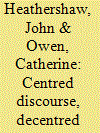

|
|
|
|
|
| Summary/Abstract |
This paper challenges dominant understandings of ‘rising powers’ by developing a decentred, relational account of Russia and China in Central Asia. We ask whether Moscow and Beijing’s regional integrative strategies do not guide, but rather are led by, everyday interactions among Russian and Chinese actors, and local actors in Central Asia. Rising powers, as a derivative of ‘Great Powers’, are frequently portrayed as structurally comparable units that concentrate power in their executives, fetishise territorial sovereignty, recruit client states, contest regional hegemony and explicitly oppose the post-1945 international order. In contrast, we demonstrate that the centred discourse of Eurasian integration promoted by Russian and Chinese leaders is decentred by networks of business and political elites, especially with regard to capital accumulation. Adopting Homi K. Bhabha’s notion of mimicry (subversion, hybridity) and J. C. Scott’s conception of mētis (local knowledge, agency), and using examples of Russian and Chinese investments and infrastructure projects in Central Asia, we argue that in order to understand centring discourse we must look to decentring practices at the periphery; that is, rising power is produced through ongoing interactions between actors at the margins of the state’s hegemonic reach.
|
|
|
|
|
|
|
|
|
|
|
|
|
|
|
|
| 2 |
ID:
105447


|
|
|
|
|
| Publication |
2011.
|
| Summary/Abstract |
Western geopolitical discourse misrepresents and constructs Central Asia as an inherently and essentially dangerous place. This pervasive 'discourse of danger' obscures knowledge of the region, deforms scholarship and, because it has policy implications, actually endangers Central Asia. This article identifies how the region is made knowable to a US-UK audience through three mutually reinforcing dimensions of endangerment: Central Asia as obscure, oriental, and fractious. This is evidenced in the writings of conflict resolution and security analysts, the practices of governments, the activities of international aid agencies and numerous lurid films, documentaries and novels. The article first establishes the tradition of inscribing danger to Central Asia, in both academic and policy discourse, from the colonial experience of the nineteenth century through to the post-Soviet transition and subsequent considerations of the region in terms of the war on terror. It considers several examples of this discourse of danger including the popular US TV drama about presidential politics, The West Wing, the policy texts of 'Washingtonian security analysis' and accounts of danger, insecurity and urban violence in the Ferghana Valley. It is argued that popular policy and academic texts are relatively consistent across the three dimensions of endangerment. This argument is demonstrated through a discussion of how policy-making and practice is informed by this discourse of danger and of how the discourse of danger is contested within the region. The example of urban violence in Osh, Kyrgyzstan and Jalalabad, Afghanistan in 2010 demonstrates how opportunities to mitigate conflict may have been lost due to the distortions of this discourse of danger. It concludes by raising the challenge to policy-makers, journalists and academics to contest this western geopolitical discourse and provide better accounts of how danger is experienced by Central Asians.
|
|
|
|
|
|
|
|
|
|
|
|
|
|
|
|
| 3 |
ID:
118760
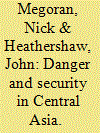

|
|
|
| 4 |
ID:
065685


|
|
|
| 5 |
ID:
158723
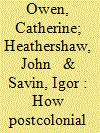

|
|
|
|
|
| Summary/Abstract |
Scholars of International Relations have called for the creation of a post-Western IR that reflects the global and local contexts of the declining power and legitimacy of the West. Recognising this discourse as indicative of the postcolonial condition, we deploy Homi Bhabha’s concept of mimicry and James C. Scott’s notion of mētis to assess whether international political dynamics of a hybrid kind are emerging. Based on interviews with Central Asian political, economic, and cultural elites, we explore the emergence of a new global politics of a post-Western type. We find that Russia substantively mimics the West as a post-Western power and that there are some suggestive examples of the role of mētis in its foreign policy. Among Central Asian states, the picture is more equivocal. Formal mimicry and mētis of a basic kind are observable, but these nascent forms suggest that the dialectical struggle between colonial clientelism and anti-colonial nationalism remains in its early stages. In this context, a post-Western international politics is emerging with a postcolonial aspect but without the emergence of the substantive mimicry and hybrid spaces characteristic of established postcolonial relations.
|
|
|
|
|
|
|
|
|
|
|
|
|
|
|
|
| 6 |
ID:
137227
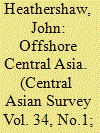

|
|
|
|
|
| Summary/Abstract |
For the first two decades of independence, most academics and policy analysts viewed Central Asia as detached from the global economy and immune to the diffusion of globalization trends. The apparent failure of ‘transition’ – allegedly manifest in high levels of corruption, elite control of critical industries and assets, and low levels of formal intra-regional trade – has been interpreted as further evidence of Central Asia's distance from the world economy and has led to new initiatives to bridge the gap. This is most evident in US State Department's recent vision of creating a New Silk Road that would increase trade and infrastructure linkages between Afghanistan and the Central Asian states.
|
|
|
|
|
|
|
|
|
|
|
|
|
|
|
|
| 7 |
ID:
061403
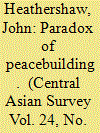

|
|
|
| 8 |
ID:
076737


|
|
|
|
|
| Publication |
2007.
|
| Summary/Abstract |
Peacebuilding is a contested concept which gains meaning as it is practised. While academic and policy-relevant elaboration of the concept is of interest to international experts, interpretations of peacebuilding in the Central Asian arena may depart immensely from those envisaged within the western-dominated 'international community'. This article opens up the dimensions and contingent possibilities of 'peacebuilding' through an investigation of two alternative approaches found in the context of Tajikistan. It makes the critique that peacebuilding represents one contextually grounded basic discourse. In the case of Central Asia, and in particular post-conflict Tajikistan, at least two other basic discourses have been adopted by parties to the post-Soviet setting: elite mirostroitelstvo (Russian: peacebuilding) and popular tinji (Tajik: wellness/peacefulness). Based largely on fieldwork conducted in Tajikistan between 2003 and 2005, the argument here is that none of these three discourses is merely an artificial or cynical construct but that each has a certain symbolic and normative value. Consequently, a singular definition of Tajik 'peacebuilding' proves elusive as practices adapt to the relationships between multiple discourses and identities in context. The article concludes that 'peacebuilding' is a complex and intersubjective process of change entailing the legitimation of new relationships of power.
|
|
|
|
|
|
|
|
|
|
|
|
|
|
|
|
| 9 |
ID:
091608


|
|
|
|
|
| Publication |
London, Routledge, 2009.
|
| Description |
xi, 224p.hbk
|
| Series |
Central Asian Studies Series
|
| Contents |
Includes Index and bibliography
|
| Standard Number |
9780415484039
|
|
|
|
|
|
|
|
|
|
|
|
Copies: C:1/I:0,R:0,Q:0
Circulation
| Accession# | Call# | Current Location | Status | Policy | Location |
| 054500 | 958.6086/HEA 054500 | Main | On Shelf | General | |
|
|
|
|
| 10 |
ID:
179373


|
|
|
|
|
| Summary/Abstract |
This article theorises the repressive security practices of authoritarian states in the context of transnationalism and globalisation. While emerging research on transnational repression has identified a range of extraterritorial and exceptional security practices adopted by authoritarian states, it has not fully studied the implications of such practices on space and statecraft. Using data from the Central Asia Political Exile Database project (CAPE) and interviews conducted with exiled Tajik opposition groups based in Russia and Europe, we theorise the spatial connections between the territorial and extraterritorial security practices using the concept of assemblages. We further outline how these practices escalate in a three-stage model, in which exiles go on notice, are detained and then rendered or assassinated. Such an approach sheds light on the inherent links between the normalisation of security practices and the creation of transnational space with distinct forms of geographical state power that is embedded in non-national spaces and is manifested through spatially organised actors, networks, and technologies within assemblages.
|
|
|
|
|
|
|
|
|
|
|
|
|
|
|
|
| 11 |
ID:
137237


|
|
|
|
|
| Summary/Abstract |
The inability of the state to maintain security and the rule of law for the purposes of foreign direct investment and industrial production is often taken as a sign of its weakness. However, such judgments say little about the actual functions of the state for global extraction industries and local political forces which demand their share of the pie. Whilst coercive state power may have decreased since Kyrgyzstan became independent, more important is the fact that the state itself has been transformed under the ruptures of, on the one hand, economic and political liberalization and, on the other, the effects of so-called ‘revolutions' of 2005 and 2010 which led to the wholesale restructuring of national structures of clientelism. Based on ethnographic research conducted in Talas province, documentary sources and interviews with gold mining companies and state officials, the paper investigates the state's shifting roles with respect to Kyrgyzstan's gold mining sector. Firstly, it explores the state as a source of rents for officials who grant and rescind licences in exchange for formal and informal payments from foreign investors, often via offshore vehicles. Secondly, it considers the role of the state as mediator between foreign investors and their access to sites. Finally, it identifies the state as performer of its status as sovereign power despite its inability to prevent uprisings and actually guarantee the promised access to its territory.
|
|
|
|
|
|
|
|
|
|
|
|
|
|
|
|
| 12 |
ID:
104069
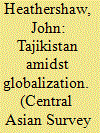

|
|
|
|
|
| Publication |
2011.
|
| Summary/Abstract |
This paper considers the nature of Tajikistani statehood in an era of globalization. It takes as its foil a recent report of the International Crisis Group, 'Tajikistan: on the road to failure'. The paper interrogates this claim and finds that it is based on a poor conceptualization of the state which disregards advances in state theory made in the last two decades. However, this problematic declaration cannot simply be dismissed but, being from an authoritative source, must be considered for its constitutive functions for Tajikistani statehood. The paper thus considers Tajikistan's position in world politics theoretically in terms of the sociological and anthropological literature on global assemblages, particularly Sassen's concept of denationalization. It goes on to investigate a single case of the contemporary Tajikistani state: the state-owned Tajik Aluminium Company's (Talco) international trading arrangements and tolling agreements. The paper argues that the post-Soviet, post-conflict Tajikistani state is not simply captured by elite networks or a shell for the personnel of the regime. Rather, whilst an explicitly 'nationalizing state', it has been transformed along the lines of denationalization. Tajikistan's official institutions, in cooperation with global actors from multinational corporations to donor agencies, have been incorporated within certain global economic and political assemblages. The paper discusses the implications of all this in terms of the consequent hollowing out of the national-territorial state model and the establishing of lines of economics and politics which make the state, in parts, global.
|
|
|
|
|
|
|
|
|
|
|
|
|
|
|
|
| 13 |
ID:
090584


|
|
|
|
|
| Publication |
2009.
|
| Summary/Abstract |
Tajikistan's peace is symbolic not just in that it conceals an alternative reality but in that its symbols often indicate the absence of the object which they ostensibly represent-and the presence of its antonym. These signs are constructive of the kind of peace that has emerged in Tajikistan over the last decade and a half. Yet, as this essay has demonstrated interpretively, symbolic politics in Tajikistan is in some respects enveloped by a virtual politics of peace and peacebuilding where such a rendering of presence and absence is illusive. This substitution of an object's fixed meaning by shifting markers which develop a life of their own is an inherent ambiguity found in signs of international peacebuilding and national stabilisation.
|
|
|
|
|
|
|
|
|
|
|
|
|
|
|
|
|
|
|
|
|